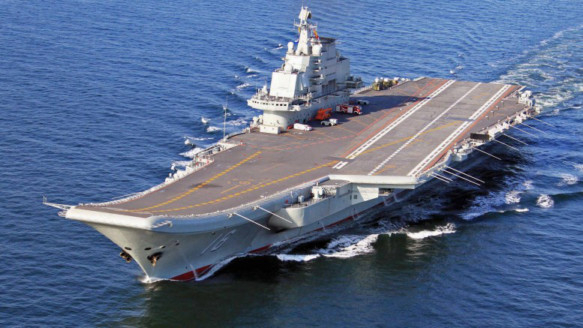
The world’s most dangerous flashpoint got much more dangerous on Thursday when China sent its lone aircraft carrier into the Taiwan Strait and Taiwan scrambled fighter jets in response. This is how accidental wars start: Provocation and counter-provocation in an environment with too much uncertainty. The uncertainty arises from not knowing the answer of the administration of United States President Donald Trump to a pressing foreign policy question: Would the US defend Taiwan from a Chinese attack?
The answer as a matter of US policy has long been complicated. Legally, the US has no treaty obligation to defend Taiwan and the Taiwan Relations Act of 1979 says only that the US would view an attack with “grave concern”. Analysts refer to this as a policy of “strategic ambiguity”.
In practice, however, the diplomatic and defence establishments have long assumed that the US would defend Taiwan as vigorously as it would Japan or South Korea, with which it has mutual defence treaties — for the simple reason that failing to defend Taiwan would be seen as a signal that the US might not defend its official Pacific friends.
A Trump White House may well change this calculus — and no one in the region, or the US, knows for sure. On the one hand, Trump’s Secretary of State Rex Tillerson took a tough line at the beginning of his Senate confirmation hearings on Wednesday. He compared China’s expansive, aggressive actions in the South China Sea to those of Russia’s in Crimea, which certainly would go along with a commitment to defend Taiwan.
On the other hand, Trump himself was dismissive of a recent Chinese military provocation, the seizing of a waterborne US drone from near a naval warship in December, commenting that China could keep it. That implied a shift from past US policy: Where former presidents George W. Bush and Barack Obama sought to contain China militarily while welcoming its economic growth, Trump seems inclined to go the other way. He sees China as an economic threat while appearing thus far uninterested in military confrontation. And his generally isolationist-tilting foreign policy views would similarly suggest a disinclination to defend Taiwan.
In other words, Trump’s administration may be readying itself for a historic shift in US defence posture towards China in the Pacific. Or maybe not. The point is that the heightened uncertainty has practical implications. China can be expected to keep on testing Trump, especially given his anti-Chinese rhetoric during the campaign and his appointment of a staunchly anti-Chinese academic, Peter Navarro, to lead his trade council.
Precarious domestic economy
From China’s perspective, military and economic confrontation can be deployed as useful proxies for each other. When Trump challenges China on trade, as with the Navarro appointment, China can respond by revealing anti-aircraft guns on its newly-created islands in the South China Sea — or by sending a carrier into the Taiwan Strait. Neither of these upsets China’s precarious domestic economy, but each is intended to send Trump a message.
As uncertainty makes China more aggressive, it will have an identical reciprocal effect on Taiwan. Taiwan’s leadership cannot know exactly how far China is prepared to go. Without the high probability of US support, Taiwan must try to deter China’s behaviour by itself.
Mutual provocation is scary because it can lead to accidents. Planes and ships can smash into each other, and split-second decisions can lead to disaster.
What’s more, uncertainty itself can contribute to wars that both sides would rather not fight. According to one classic account, one reason rational countries nevertheless go to war is when each side has its own assessment of the relative strengths and weaknesses. Different assessments can lead to situations where the only way to find out who is right is to fight the war and see who wins. If China and Taiwan have strongly different assessments of what Trump’s policy would be, that increases the odds of war between them.
What makes this high-risk environment into something like a perfect storm is the presidency of Tsai Ing-wen, who took office last May. Tsai and her Democratic Progressive Party are far more independence-oriented than any of her predecessors.
To be sure, Tsai has tried to tread carefully since her election, avoiding direct provocation of China, which views Taiwan as ultimately a part of China. Yet, in the final analysis, the existence of Tsai’s party depends on the basic assumption that Taiwan is an independent country — and a democracy. That vision puts Taiwan on a collision course with Chinese President Xi Jinping’s vision of an increasingly nationalist and expansionary China.
In 2013, when I was trying to imagine the highest-risk scenario for a China-Taiwan war, I postulated one in which Tsai was president of Taiwan and China sent its new carrier into the Taiwan strait. That’s now happened. The question is what, if anything, Trump is going to do about it. The answer is much more important for the world than anything in the disputed dossier that’s dominating the headlines.
— Bloomberg
Noah Feldman is a Bloomberg View columnist.








